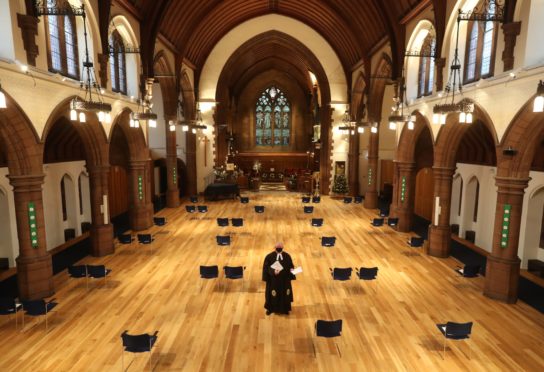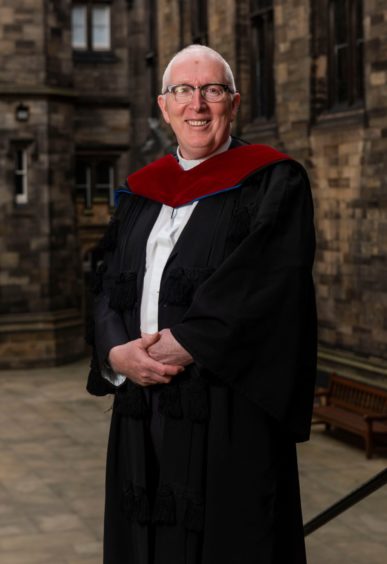
A more compassionate society where faith plays an increased role in supporting people and communities could be part of the pandemic’s enduring legacy, according to the moderator of the Church of Scotland.
The Right Reverend Dr Martin Fair, whose year as moderator of the general assembly has been dominated by the challenges of Covid, believes the shock of coping with the pandemic could help forge a stronger and more modern Kirk.
The last 10 months have been an unprecedented challenge for the church, like all institutions, as congregations and ministers struggled to find a new normal.
Comforting the ill and the bereaved in person became impossible and churches were forced to close their doors to worshippers for the first time in history as congregating anywhere, even in Scotland’s places of worship, was banned.
However, Dr Fair believes the rush to use technology to find new platforms for worship has allowed far more people to be reached than just traditional church-goers.
Services have reached audiences up to four times larger than those who were attending church as people turned to faith to help them cope with the uncertainty of life during Covid-19.
People also stepped up to help the most vulnerable, and Dr Fair believes people’s priorities have shifted and they have rediscovered a sense of community, which could help the Church flourish in the future.
He said: “You can’t live life on your own so we’ve found ways to interact and I think the Church has been very central to that and will be part of what we very much emphasise as we go forward.
“Sometimes as you come through a crisis you do re-evaluate your own life and what’s important and what matters to you.
“I would not be at all surprised if folk looked to continue an association with churches, and maybe some will never come through the door but the thing is the church is absolutely committed to continuing the online engagement and understanding that that will be what works for some people.
“We will be thinking of what membership of churches means in a new way as a result of this. It’s going to be much broader. Some people will be very invested in them locally, some people will connect remotely and perhaps in looser ways but the Church will definitely offer a channel for people who want to express that desire to care and be compassionate for those in need.
“The church has always been to the fore on that, and so people that have rediscovered that within their own selves might well find that through the church they can express some of that.
“We were already moving in this direction but this has accelerated it. Somebody said to me early in lockdown that we’ve advanced 10 years in 10 weeks and that’s about right.”
Dr Fair began his year-long term as moderator of the General Assembly of the Church of Scotland last May, during the first national lockdown. Instead of taking on the traditional role of travelling and meeting politicians, he has been involved with supporting ministers and inspiring them to embrace the changes.
Without the collections on a Sunday or fees for weddings and other church services, finances have been challenging but Dr Fair is encouraged by statistics showing the number of people using search terms related to prayer or God online increased by more than 100%.
He said: “That would be an indication that people were asking questions, people were wondering about some of these deeper questions, and for me that was really born out of the realisation in some ways of our own fallibility as humans or our own fragility. We often tell ourselves that we’re pretty much in charge of our own destinies, then this came along and suddenly challenged that.
“So I think a lot of people were asking deeper questions, and people don’t necessarily associate the asking of those questions with showing up at a church on a Sunday morning.
“But the availability of so much by way of an online church and spirituality more widely, I think gave people an entrée.”
Dr Fair’s own church, St Andrews Parish Church in Arbroath, Angus, had already been streaming services online for six years but now it is happening at almost every church around the country.
Some ministers seized the opportunity to be more creative online while others who were less tech-savvy were supported by colleagues in operating Zoom and uploading ready-made services.
Worshippers who were unable to participate online were supported to join in on the phone, or print-outs of services were delivered to their homes. Dr Fair believes the work has helped the Church combat its stuffy, traditional image.
He added that the process began before Covid-19 to sell off surplus properties so congregations could focus on people rather than fundraising to maintain ageing buildings. The married father of three said: “We do have to continually work against a negative perception, and the reality is it is just perception because knowing the Church as I do across the country it is much more creative and brighter than some would give it credit for.
“This has given us the opportunity to show some of that and maybe as we go forward to throw off some of those perceptions and prove that the church is meaningful.
“A lot of people don’t consider themselves to be religious. Neither do I in many ways. I much prefer the word spiritual. When you engage with ordinary folk who might never come near the church, almost everybody is spiritual in one sense or another. Christians can be absolutely 21st Century, not stuck in the past, and very much engaged with wider society.”
One of the key challenges for ministers during the pandemic has been finding ways to support the sick, dying and bereaved with limited face-to-face contact.
The Church has provided ministers with extra pastoral care and they also use a private Facebook group where they can be supported by colleagues.
People are asking deeper questions and we can help find the answers
Dr Fair has phoned more than 500 ministers since he was appointed, and his opening gambit is always: “How are you doing?”
He said: “With funerals, having to conduct bereavement visits ahead of the funeral on Zoom, not being able to be right there with people to give hugs and things, has been really, really tough on ministers.
“Obviously as a result of circumstances you just have to get on with it but I know that it’s been really hard for ministers, without doubt.
“I think they’ve found that probably about the hardest thing. Feeling that they’re not able to be as pastorally present as they would want to be.”
But he believes the Church’s efforts during Covid-19 have strengthened its foundations and seen it reconnect with people and make them its priority.
He said: “I continue to be really hopeful for the life of the Church of Scotland, and if I didn’t think that quite honestly I would probably go and find another job.
“If I thought I was just going to be involved in something that was just going to run down and basically in the end we would close the last church, put the milk bottles out and turn the lights out then I would go and do something more fruitful with my life, I really would.
“But I don’t feel that at all, I feel great hope for the Church in the 21st Century as we go forward and that’s exciting.
“It will require us to be creative and innovative and to shake the dust off in some ways. Some of our practices belonged in the past, we need to discern which things we need to let go of and which new things we need to pick up. If we get that balance just right then we will be on a good track.
“So not that for one moment I say that we welcome Covid because there’s been such tragedy associated with it, but we might well look back and say that out of all the struggles and frustrations actually we learned some stuff and there is the potential for us to emerge stronger on the other side.”
Finding the light online: Minister leads the Kirk towards a more connected tomorrow as digital services surge
He is the Kirk’s minister of the internet, a grandad of 73 reaching a congregation of 500,000 with his new Sanctuary First parish.
The Rev Albert Bogle’s stipend is paid for by donations, charity support and the Church of Scotland.
But when he first suggested the Kirk’s future and indeed survival lay in online parishes some shook their heads in disbelief. However, as the Covid-19 pandemic forced the closure of churches across Scotland, his online ministry flourished.
Now Kirk members are watching the Rev Bogle’s sermons and online discussions to ponder whether or not God is missing in action during the pandemic. The Rev Bogle said the Covid crisis had encouraged people to look for light in the darkness. “People are looking for the meaning in Covid at a time when a million people have lost their lives globally,” he said.“I am reaching 113 countries and have 5,000 members with daily Bible readings. My online pages turnover has reached 500,000 – not something I could ever have imagined as a minister at previous charges or indeed as the Moderator of the Kirk in 2012 to 2013. This is part of the future of the hybrid church, the streamlined hybrid church.
“There will be closures of high street churches and some buildings will be repurposed to become housing, for example.
“I am not doing anything new because the first Christians met in each other’s homes and online services are today’s equivalent. I certainly do not think that the church is going to die but nothing in life stays the same.
“Debenhams is closing, the high street is changing – and so is the church and it is thriving.”
Virus accelerates radical blueprint to restructure church finances
Building a sustainable financial future for the Church of Scotland is vital after the shock of the pandemic, according to its chief officer.
A radical action plan for restructuring and financial accountability had already been put in place before the Covid-19 pandemic.
The merger of congregations and sell-off of surplus buildings was also under way. But the changes have been accelerated by coronavirus and Dave Kendall, who was appointed the Kirk’s first chief officer as part of the financial plan, believes the pandemic has helped speed up the process.
Mr Kendall said: “Your planning assumptions have to keep changing and the horizon keeps changing.
“You can’t have any real certainty about when you can return to anything like normality in this. It’s difficult.
“But some of these new ways of work and adapting to different ways of work were all part of the picture, having much more robust accountability, closer working with everybody, all these things were part of the plan.”
Work has started to amalgamate churches where it makes geographic sense, with ministers in Aberdeen spearheading cooperation between neighbouring congregations.
Three churches in Broughty Ferry, near Dundee, are also set to join up later this year, while three in Paisley have done so in recent years.
The Kirk currently has 21 churches along with houses and community centres for sale on its website.
The Rev James Wilson, Dundee Presbytery Clerk, said: “It is too early to see to what extent we have been impacted by Covid.
“Certainly, income from hall hires and collections are down because clubs have stopped during social distancing and restricted attendances at church mean lower collections.
“I can see contactless payment being introduced for donations in churches and parishioners will be able to tap their phones on the way in.”
The Rev Doug Gay, principal of Trinity College and lecturer in practical theology at Glasgow University said: “The Kirk is going through the most significant set of reforms. Covid has had this effect across many institutions. Very few organisations will go back to what they were before.”

Enjoy the convenience of having The Sunday Post delivered as a digital ePaper straight to your smartphone, tablet or computer.
Subscribe for only £5.49 a month and enjoy all the benefits of the printed paper as a digital replica.
Subscribe © Cameron Brooks
© Cameron Brooks